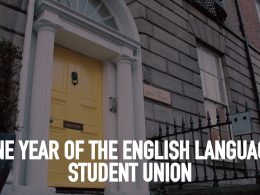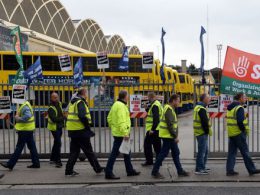By Michael O’Brien
The vast majority of working-class people in Coolock, Darndale, across Dublin and the country, will be horrified by the racist violence around the old Crown Paint factory on the Malahide Road over the last week. These events will intensify fear and anguish felt by migrants and people of colour already suffering from daily instances of racism and xenophobia. The events also again point to the mishandling of such incidents by the authorities, the rise of an emboldened far right and the alienation that they can cynically tap into and manipulate by stirring up hate and division.
The separate attack last week on the refugee encampment along the City Quay, which included a Palestinian refugee, by masked men armed with bars and knives underlines this. It is only a matter of time before another migrant or person of colour is killed by far-right racist predators.
The predatory role of far-right agitators
Well-known far-right agitators, including recently elected councillors Gavin Pepper, Malachy Steenson and Patrick Quinlan, managed to insert themselves into a situation in Coolock, mishandled by the Government and the Gardaí, and mobilise a significant layer from the local community, including local disaffected youth.
The trigger for this riot and other mobilisations since was the move to prepare the site for receiving 550 international protection candidates – adults and children. This site was earmarked in March and gave rise to an encampment of opposition operating under the banner of ‘Coolock Says No’.
Unfortunately, those within local community organisations and public representatives who were committed to pushing back on the conscious disinformation were themselves denied timely information from the Department, putting them on the back foot. Such grassroots community and left-wing activists rooted in this deprived area are in fact key to any successful integration of refugee newcomers.
The Government, the State and the Gardaí are not trusted for very valid reasons. By avoiding such dialogue the authorities ducked having to hear legitimate demands for commitments for additional resources for the community already lacking in services.
That said, it is clear that for the racist element, which by now have assumed the status of spokespeople, no refugees are acceptable, so we should be clear that no amount of negotiation will see opposition dissipate.
Not representative of Coolock
Unfortunately, these events and their coverage in the mainstream media can give a false impression as to the nature of the local community. The northeast of Dublin city and its working-class communities have a proud recent history of anti-austerity struggle and standing up for social progress.
In the aftermath of a hard-fought campaign against the imposition of the Household and Property taxes in the area, the northeast of Dublin was the epicentre of the protests against installing water meters in 2014 – a prerequisite for imposing the water charge itself and ultimately privatising the service.
In 2014, the then ‘Beaumont-Donaghmede’ nine-seat ward which encompassed Coolock and Darndale returned three Sinn Féin (then seen as an anti-establishment alternative) and two radical left (including myself) councillors. The combined Sinn Féin, radical left and left independent vote then and in the subsequent 2016 general election dwarfed the combined votes of the political establishment parties in the working-class estates.
The 2015 Marriage Equality referendum saw a 2/1 majority voting ‘Yes’ in the then Dublin North East Dáil constituency. This was topped in 2018 during the Repeal referendum, where every door in the Dublin Bay North constituency was knocked on by a mass grassroots campaign, resulting in a 3/1 ‘Yes’ vote. In both referendums, the boxes from working-class areas, including Coolock and Darndale, saw ‘Yes’ votes of up to 90%.
Contrast these progressive majorities, sentiments which clearly still exist, to the actions of one of the prominent so-called ‘Coolock Says No’ activists who last Saturday aggressively filmed and insulted people gathering for the Trans and Intersex Pride march in Dublin City.
Impact of dire housing crisis
What has happened since? The fundamental issue driving genuine discontent in the area is the housing crisis. ‘Area B’, the name given by Dublin City Council’s Housing Department to the north-east of the city, has for over a decade had the longest housing lists. During my time as a councillor representing the area between 2014 and 2019, there was a massive spike in ‘new homeless’ and overcrowding that saw nearby hotels and dedicated ‘family hubs’ being used to house predominantly local young parents and children.
During this period it was genuinely rare to hear migrants being blamed for the housing crisis. So recent was the economic crash and resultant austerity that most working-class people including those most affected by the housing crisis knew where the blame lay. Some of the far-right cranks were around then but they had little purchase for their hate at that stage.
Underlying the accommodation crisis is a particular concentration of poverty in the immediate vicinity of the Crown Paints factory site. The Pobal HP Deprivation Index 2016 to 2022 scores the whole of Darndale, Belcamp and the part of Coolock that lies immediately south known as Bonnybrook as either ‘Extremely Deprived’ or ‘Very Deprived’, taking into account a range of indicators including incomes and access to services.
Vulture fund profiteering
As construction did pick up in the area we saw the wrong kind of accommodation being built, with all the emphasis in nearby places like Clongriffin, Balgriffin, Belmayne and Clare Hall being on high-rise, build-to-rent apartments. These were sometimes snapped up wholesale by ‘Cuckoo funds’ and then rented at prices unaffordable to the mass of people with a housing need.
However, despite the efforts of housing activists, then and since, the construction of a people-power-style movement, as we had during the water charges and repeal, has not happened around the housing and accommodation crisis.
Part of the responsibility for this has to be put at the feet of the leaders of the official trade union movement and Sinn Féin, who together during this period had the resources to help build a social movement and put the political establishment under serious pressure. Instead, initiatives such as ‘Raise the Roof’ have been tokenistic.
In recent years, the impact of the Covid lockdown – boosting the audience of the far right – compounded by the multiple global crises of the war in Ukraine and the other factors driving movements of people, combined with the failure of the State to manage the needs of those fleeing war and persecution, has culminated in what has taken place in Coolock and similar disturbances elsewhere.
Warning to the trade union movement
This turn of events is a serious warning to the trade union movement and anyone that considers themself to be on the left and standing for social progress. These forces have to build a real movement to fight for the solutions to the housing crisis that can mobilise vastly bigger numbers than the far right can.
Supporting state repression like that deployed against the rioters in Coolock, as some on the anti-racist side have, is a mistake. The establishment has created the conditions that have permitted anti-immigrant sentiment to grow and the far-right to develop. They have contempt for working-class communities as evidenced by Fianna Fáil’s Timmy Dooley’s support for sending in the army!
While this time the Public Order Unit has been deployed to restore order in the context of a racist riot it also has been deployed in recent times to forcibly remove homeless migrants in Dublin City Centre and to back the employers on picket lines, as was seen near the end of the struggle of Debenhams workers.
The approach by the State in working-class areas is distinctly different from more affluent areas, of which little has been asked in terms of accommodation of international protection applicants – and instead hostile architecture is erected along the canals to prevent camping.
The left response needed
The question is posed as to what type of left response is needed. For as long as we have Fine Gael / Fianna Fáil-dominated governments the initiative will be left to the private developers when it comes to housing. The system of global capitalism that they defend is responsible for the very factors – war, famine, unemployment, lack of accommodation, climate change, grossly uneven development and exploitative economic relations – that give rise to involuntary movements of populations the world over, including young Irish people leaving this country. In other words, working-class people here and refugees are victims of the same system.
The response of Sinn Féin, which has been to shift to a more right-wing position and embrace talking points virtually indistinguishable from the Government, has only served to bolster the far right. This has reached a new low when Sinn Féin TDs this month supported a Government proposal to create a two-tier citizenship that empowers the withdrawal of citizenship from those who have legitimately obtained it.
A better example can be found in France where the New Popular Front, spearheaded by Jean Luc Melenchon’s La France Insoumise, in the recent elections presented clear anti-austerity and pro-worker reforms and an anti-racist message. It mobilised millions of working-class people to vote and at least for now cut much of the ground from under the far-right Rassemblement National.
Movement from below needed
A critical factor in bringing this into being was the active mobilisation of young and working-class people from below. For example, 640,000 took to the streets to oppose the far right after the recent European elections. Working-class and young people in Ireland who are watching in horror as Government policies facilitate the far right to intervene and get an echo for their racist scapegoating, need to overcome their understandable shock at these events and decide to get active to push back and build an alternative. The Socialist Party feels that everyone on the left, including People Before Profit – Solidarity, other groups and individuals on the left etc., should try to build a united front against the far right. However, it can’t be one tailored to Sinn Féin who have politically buckled on immigration and on Gaza, and it can’t be just geared towards the next election.
We need a united front against racism and fascism which is geared towards organising at least a chunk of the population that is determinedly anti-racist and anti-fascist, but needs to become actively so. The left in Ireland is small, but it has a role to play in persuading and facilitating new layers of people to become active in a new movement that should oppose the far right, racism and demand immediate action to address the multiple crises in our society – such as housing and the lack of much needed social services, devastated by a decade and a half of austerity and underfunding.
The task of building a viable, mass anti-capitalist alternative that offers the socialist policies needed to offer hope to working-class people ground down by a system incapable of providing a decent living remains. This means seizing the wealth from the super-rich and big business and bringing it into democratic public ownership to be used for the benefit of all.
The events of the last week highlight again the urgent necessity to build such a movement.












